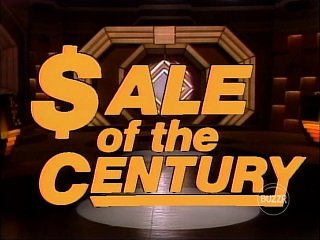
Who Wants to Be a Millionaire? is an international television game show franchise of British origin, created by David Briggs, Mike Whitehill and Steven Knight. In its format, currently owned and licensed by Sony Pictures Television, contestants tackle a series of multiple-choice questions to win large cash prizes in a format that twists on many game show genre conventions – only one contestant plays at a time, similar to radio quizzes; contestants are given the question before attempting an answer, and have no time limit to answer questions; and the amount offered increases as they tackle questions that become increasingly difficult. The maximum cash prize offered in most versions of the format is one million of the local currency.

Sale of the Century is an American television game show that debuted in the United States on September 29, 1969, on NBC daytime. It was one of three NBC game shows to premiere on that date, the other two being the short-lived game shows Letters to Laugh-In and Name Droppers. The series aired until July 13, 1973, and a weekly syndicated series began that fall and ran for one season. Actor Jack Kelly hosted the series from 1969 to 1971, then decided to return to acting full-time. He was replaced by Joe Garagiola, who hosted the remainder of the daytime series plus the one season in syndication.
The Joker's Wild is an American television game show that has aired at different times since the 1970s. Contestants answer questions based on categories determined randomly by a mechanism resembling a slot machine. The show's title refers to the game's slot-machine mechanism also having jokers.

History IQ is a game show on The History Channel which premiered on October 2, 2000 and aired for two seasons. Marc Summers hosted and Harvey announced, reuniting the two from the Nickelodeon game show Double Dare. History IQ was produced by Glow in the Dark Productions.

BrainTeaser was a British game show based on the original Dutch format of Puzzeltijd, first broadcast in 2002 produced by Endemol UK subsidiary Cheetah Productions.

Pilipinas, Game Ka Na Ba? was a Philippine game show by ABS-CBN The show was hosted initially by and was replaced by Edu Manzano in the latter versions. It was also aired on The Filipino Channel. The show was broadcast from October 8, 2001 to October 23, 2009. ABS-CBN Studio 8 in Quezon City.
The Money Maze is an American television game show seen on ABC from December 23, 1974, to June 27, 1975. The show was hosted by Nick Clooney and was announced by Alan Kalter. It was produced by Daphne-Don Lipp Productions, of which Dick Cavett was a principal.

Tic-Tac-Dough is an American television game show based on the paper-and-pencil game of tic-tac-toe. Contestants answer questions in various categories to put up their respective symbol, X or O, on the board. Three versions were produced: the initial 1956–59 run on NBC, a 1978–86 run initially on CBS and then in syndication, and a syndicated run in 1990. The show was produced by Barry & Enright Productions.

Who Wants to Be a Millionaire? is a British television quiz show, created and formerly produced by David Briggs, and made for the ITV network. On air since September 1998 and devised by Briggs, the show's format sees contestants taking on multiple-choice questions based upon general knowledge, winning a cash prize for each question they answer correctly, with the amount offered increasing as they take on more difficult questions. If an incorrect answer is given, the contestant will leave with whatever cash prize is guaranteed by the last safety net they have passed. However, a contestant can decline to answer a question, and thus walk away with their full winnings. Contestants are given "lifelines" to help answer questions.

Temptation was an Australian game show which premiered on the Nine Network on 30 May 2005 and aired at 7.00pm. Hosted by Ed Phillips and Livinia Nixon, the show was a remake of Sale of the Century, which aired on Nine in the same timeslot for more than twenty years between 1980 and 2001. Temptation had the same general format of its predecessor, but with several new features and a deemphasis on the "shopping" aspects of the endgame. The show ran until 30 November 2007, when it was placed on hiatus by the network following strong competition from game show Deal or No Deal on the rival Seven Network; during the hiatus, Nine filled the timeslot with episodes of the American sitcom Two and a Half Men. When Ed Phillips made an appearance on The NRL Footy Show he announced "maybe summer" would be the return of the show. This statement was accurate, as Temptation returned for a shortened fourth series from 1 December 2008 with unaired episodes which were recorded during 2008. During that time, Ed Phillips was dumped by the Nine Network after his contract expired in November, and Temptation never returned to the schedule. After 23 January 2009, when the show's final episode aired, all Temptation websites were removed, and Two and a Half Men returned to Channel Nine's 7:00pm schedule.

The Mint was a live, late night, interactive quiz show with celebrity guests and live studio contestants filmed on a large extravagant set designed to look like the inside of a mansion. The programme, which was dogged by criticism that its questions were ambiguous and arbitrary, aired on ITV and ITV2, Sunday to Wednesday. On 26 February 2007, ITV announced that The Mint would return to screens later in 2007, however an announcement on 12 September 2007 confirmed that the show, along with similar late night phone ins, would not be returning.

Where in the World Is Carmen Sandiego? is an American half-hour children's television game show based on the Carmen Sandiego computer game series created by Brøderbund Software. The show was hosted by Greg Lee, who was joined by Lynne Thigpen, and the a cappella vocal group Rockapella, who served as the show's house band and comedy troupe. The series was videotaped in New York City at Lifetime Studios and co-produced by WQED and WGBH-TV, and aired on PBS stations from September 30, 1991 to December 22, 1995, with reruns continuing to air through October 4, 1996. A total of 295 episodes over five seasons were recorded.

Merv Griffin's Crosswords is an American game show based on crossword puzzles. The show was created by its namesake, Merv Griffin, who died shortly after beginning production on the series. Ty Treadway was the host, and Edd Hall was the announcer.

GSN Live is an American live interactive show on Game Show Network that premiered on February 25, 2008, at noon ET and officially ended its 3-year run on July 29, 2011. The last "live" edition aired May 13, 2011. It lasted three hours in between regular GSN programming and featured games that viewers played to win prizes over the phone, highlights from Classic game shows, interviews, behind-the-scenes views of GSN, and celebrity appearances. It was formerly hosted in two shifts. The first shift, from Noon to 3:00 p.m. ET was hosted by Heidi Bohay. Fred Roggin hosted the 3:00 p.m. to 6:00 p.m. ET segment. Kelly Packard co-hosted from September 15 to November 28, 2008, and Roggin co-hosted the 3 hours with rotating guest hosts until Debra Skelton was chosen to replace Packard on May 26, 2009, the same day the current set was introduced and when it was hosted by three people. Fred Roggin left GSN Live on July 2, 2009, Alfonso Ribeiro left GSN Live on August 11, 2009, Debra Skelton left GSN Live on January 2010, and Heidi Bohay left the show in April 2010, making Bob Guiney currently the sole host. The show was executive produced by Burt Dubrow until March 6, 2009, and is currently produced by John Berkson, Gary Green, and Laura Slobin. The sound mixer was Mike Dooley. Budget cuts implemented by the new GSN executive regime are causing the almost weekly dismissals of production staff members from the show. Due to these cuts the show was cut from six hours to three hours and now runs from 3:00 p.m. to 6:00 p.m. ET. The staff was cut by 7 effective December 30, 2009, leaving the future of the show in question.
A lock-out device is a system used on game shows, particularly trivia shows, to determine in real time which contestant has activated their signal first. The system is designed to detect the first signal it receives and ignore subsequent signals. The system provides some indication of which contestant has signaled, such as a light or sound for each contestant, allowing the relevant parties to clearly determine who has signaled first.

10 Ka Dum is an Indian version of the popular international reality game show Power of 10, and aired on Sony Entertainment Television (India). The show was hosted by popular Bollywood actor Salman Khan. According to reports, the show helped Sony TV regain its third position in the Indian television ratings. A third season was announced which would premiere on 4 June 2018, also on Sony Entertainment Television. The Grand Finale Guest of the third season were Shahrukh Khan and Rani Mukherjee.The final episode also had a special entry of Comedian Sunil Grover in his avatar Rinku Bhabhi and Amitabh Bachchan.
The Phone is an American reality television show, based on the Dutch version of the same name. The show aired on Fridays at 10pm Eastern time on MTV
20Q is an American game show based on the online artificial intelligence and handheld computer game of the same name. Licensed to and produced by Endemol USA, it premiered on June 13, 2009 during Big Saturday Night airing on GSN, and is hosted by Cat Deeley of So You Think You Can Dance with the voice of the computer provided by Hal Sparks.
Jeopardy! is an American television game show created by Merv Griffin. The show features a quiz competition in which contestants are presented with general knowledge clues in the form of answers, and must phrase their responses in the form of questions. The original daytime version debuted on NBC on March 30, 1964, and aired until January 3, 1975. A weekly nighttime syndicated edition aired from September 1974 to September 1975, and a revival, The All-New Jeopardy!, ran on NBC from October 1978 to March 1979. The version airing as of 2020, a daily syndicated show produced by Sony Pictures Television, premiered on September 10, 1984.

Ask Me Another is an hour-long radio puzzle game show produced by WNYC and National Public Radio. It is hosted by Canadian comedian Ophira Eisenberg and features as its "in-house musician" or "one-man house band" independent rock musician Jonathan Coulton. Episodes of the show are usually recorded at The Bell House in Brooklyn, New York, however the show does go to various states across the country and record one or more episodes from those locations. The show has been produced by WNYC Studios since 2012.














